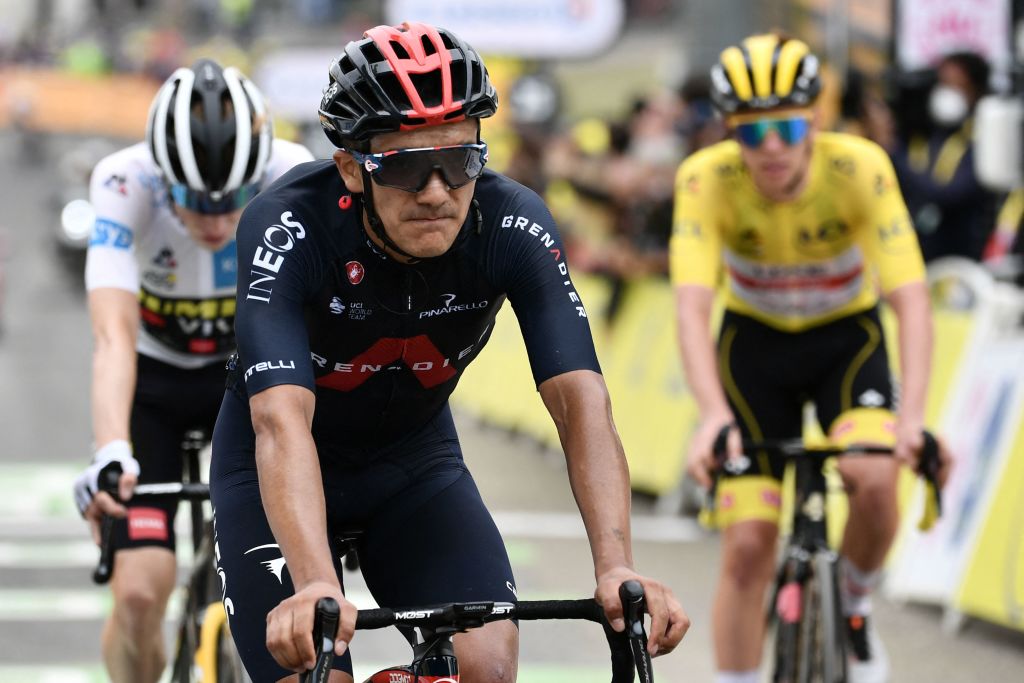Carapaz set to claim Ecuador's first podium finish in Tour de France
Ineos rider questions if his home country comprehends the full significance of his result

Richard Carapaz (Ineos Grenadiers) heads into the final Tour de France stage in Paris on Sunday securely in third place overall, thereby capturing a first top-three finish in the Tour both for himself and for Ecuador as well as his team's second Grand Tour podium of 2021 after Egan Bernal's victory in the Giro d'Italia.
It is a result that will find its way into Ecuador's sporting history books. As winner of the 2019 Giro d'Italia and runner-up in the 2020 Vuelta a España, Carapaz' third place in the Tour is also his third podium in three years. He is also only the second Latin American, after Nairo Quintana (Arkea-Samsic), ever to claim a Grand Tour podium 'set'.
A respectable, incident-free 23rd place on the final time trial of Saturday, 2:09 down on stage 20 winner Wout Van Aert (Jumbo-Visma) allowed the Ecuadorian to remain in third place.
But as he eyes the rest of the season starting with the Olympics and perhaps continuing with the Vuelta, Carapaz told reporters on Saturday evening that while immensely pleased with his result, he remained uncertain of the degree of its impact back home in Ecuador.
"It's important for my country to have such a top result, we need the next generations of bike riders to be nurtured and educated in this sport because they are the future," Carapaz said.
"But many people in Latin America want to do sport and they don't have the opportunities they need, like not having a chance to have a bike."
"And in my country, too, they are very conservative [regarding cycling], and there is a general mindset that finds it hard to believe what we are capable of doing. I really don't know if Ecuador is really aware of how much it means to have taken a third place in the Tour."
The latest race content, interviews, features, reviews and expert buying guides, direct to your inbox!
Carapaz was not only referring to the poverty which affects some parts of Latin America. Not for the first time, he was also referring to professional cycling's low social visibility in Ecuador, where it remains a minority sport in parts of the country, and to the dearth of public and private investment in its infrastructure as well.
As one of the four of Ineos Grenadiers Tour de France GC leaders to get through the first week with his overall options intact, Carapaz briefly looked like future winner Tadej Pogacar's most determined opponent when he broke away late over the steep Signal d'Uchon climb on stage 7.
But Carapaz was reeled in before the finish and subsequently, he was as powerless as the rest of the field at Le Grand-Bornand when the UAE Team Emirates racer remorselessly crushed the field.
From then on and propelled to the front by Ineos Grenadiers' hard work on the climbs, Carapaz's best moments on the Ventoux and in the Pyrenees were enough distance his other rivals but were never sufficient to get the better of either Pogacar or second-placed Jonas Vingegaard (Jumbo-Visma).
However, Carapaz said he remained very pleased with how he had raced, and with his consistency throughout. "I didn't have any particular high points, but there weren't any low points either," he insisted. "I think that's why I'm satisfied because I was able to take third by staying steady all the way."
He admitted that Pogacar's performance on the climbs had been daunting to experience first-hand, but insisted that he and Ineos continued to "push hard on all fronts."
"He was very strong, yes. On telly, it sometimes looks easy when we're riding in a stage, but in fact, there were points when it was very difficult to handle. Pogacar did an amazing race, and I can only congratulate him."
Despite Pogacar's overwhelming strength, Carapaz denied that Ineos Grenadiers had ridden to finish second or third in the race, saying that "all teams come here to win. That was what we wanted when we started, too. But in sport, there can always be somebody who's performing better than you.
"We did a good job, we were very active, and we kept trying. And for me personally, I've only been a pro for five years, and I've been on the podium of three Grand Tours.
"That's very important for me and I want to continue in this direction in the future, working on my strengths and weaknesses. But for now, being one of the three strongest riders in this Tour de France matters a lot."
Alasdair Fotheringham has been reporting on cycling since 1991. He has covered every Tour de France since 1992 bar one, as well as numerous other bike races of all shapes and sizes, ranging from the Olympic Games in 2008 to the now sadly defunct Subida a Urkiola hill climb in Spain. As well as working for Cyclingnews, he has also written for The Independent, The Guardian, ProCycling, The Express and Reuters.
